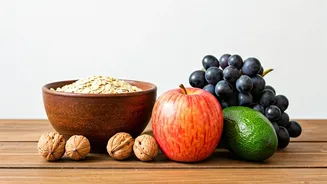Oatmeal: Heart-Healthy Start
Oatmeal stands out as a champion in the fight against high cholesterol. Its effectiveness stems from its soluble fiber content, which acts like a sponge,
absorbing cholesterol in the digestive system and preventing its absorption into the bloodstream. This process helps to reduce the levels of low-density lipoprotein (LDL) cholesterol, often referred to as 'bad' cholesterol. Consider making oatmeal a regular part of your breakfast. Adding fruits such as berries or a sprinkle of nuts provides extra nutrients and enhances the taste. Starting your day with oatmeal is a simple yet impactful way to prioritize heart health, and potentially observe improvement in as little as three months. Remember, consistency is vital, aiming for regular consumption to experience the best results.
Fatty Fish: Omega-3 Boost
Fatty fish, such as salmon, mackerel, and tuna, are rich in omega-3 fatty acids, crucial allies in lowering cholesterol. Omega-3s work in several ways to support heart health. They can reduce triglyceride levels, a type of fat in your blood that can contribute to artery plaque, and slightly increase high-density lipoprotein (HDL) cholesterol, often referred to as 'good' cholesterol. To gain these benefits, aim to include fatty fish in your diet at least twice a week. You can prepare them in diverse ways, such as grilling, baking, or poaching. For example, a baked salmon fillet with a side of steamed vegetables provides a delicious and heart-healthy meal. Incorporating fatty fish into your diet is a flavorful way to promote cardiovascular wellness. Remember, consistency in consumption is key to experiencing positive effects over time.
Nuts: A Nutritious Powerhouse
Nuts are small packages of nutritional might that can positively affect your cholesterol levels. Varieties such as almonds, walnuts, and pecans, contain unsaturated fats, which help lower LDL cholesterol. They also offer fiber, which further aids in cholesterol management by binding with it during digestion and removing it from the body. Nuts provide vitamins, minerals, and antioxidants, contributing to overall health. It's best to consume nuts in their natural state, such as raw or dry roasted, to avoid added sugars and unhealthy fats. A handful of nuts as a snack can keep you feeling satisfied. However, moderation is important, as nuts are calorie-dense. Including nuts in your diet is a simple and enjoyable strategy for supporting healthy cholesterol levels and benefiting your overall well-being. Regular intake, in reasonable portions, is critical to see positive changes.
Soy-Based Foods: Cholesterol's Foe
Soy-based foods, which include tofu, edamame, and soy milk, have been linked to reductions in LDL cholesterol. They contain protein and isoflavones, compounds that may contribute to these benefits. Replacing some animal-based protein sources with soy-based foods can be a beneficial dietary change. Soy-based foods are versatile and can easily be incorporated into various meals. Tofu can be added to stir-fries or used as a meat substitute, and soy milk can be a dairy alternative in smoothies or cereals. Edamame makes a simple and nutritious snack. Soy-based foods provide a delicious and effective method to improve your cholesterol profile and overall health. Consistency in consuming these foods is important for potentially seeing changes over the course of three months.
Plant Sterols/Stanols: Cholesterol Blockers
Plant sterols and stanols are compounds found in plants that can help lower cholesterol by blocking its absorption in the digestive tract. These substances are present in many foods and are often added to certain products, such as yogurt, spreads, and orange juice. Consuming plant sterols or stanols can lead to a noticeable reduction in LDL cholesterol levels. For example, starting your day with a yogurt drink fortified with plant sterols can be an easy way to include these compounds in your diet. Alternatively, explore spreads enriched with plant sterols to use in sandwiches or with your meals. These supplements are an effective strategy, used in tandem with the other food groups to help lower cholesterol and benefit your well-being. Regular usage will give you the best results.






















